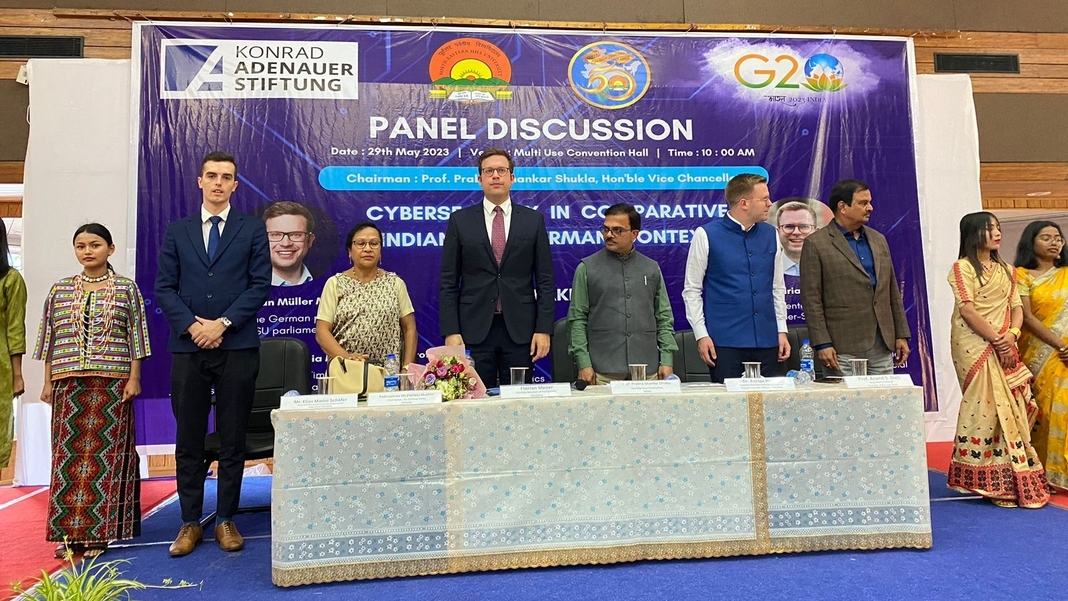Shillong, May 29: A panel discussion on “Cybersecurity in Comparative Indian and European Contexts” held with Konrad Adenauer Stiftung (KAS), New Delhi, in presence of German Christian Democratic Union (CDU) Party Member of Parliament, Florian Müller, discussed the need for a more secure virtual and digital world was at the Multi-Use Convention Hall, NEHU, Shillong Campus on Monday.
Attended by large number of students, researchers and faculty of NEHU, the MP narrated his experience of representing a mountainous province of Attendorn of Western Germany located on the foothills of Alps in Bundestag and found parallel with Shillong and Meghalaya. Securing data about genetic resources, climactic specialities and overall natural environment of a mountainous ecosystem in the digital world is a prime necessity of securing economy and culture, the German MP stated.
The panel discussion was organized by the Office of International Affairs (OIA) of NEHU and it was chaired by Prof. Prabha Shankar Shukla, Vice-Chancellor. The Vice-Chancellor stressed on stronger relationship between NEHU and Konrad Adenauer Foundation to promote faster economic growth and in developing researches of mutual interest. Vice-Chancellor Prof. Shukla detailed the need for connecting research in social and natural sciences with cultural and technological advancements in a holistic manner so that no harm could be done to public at large and individuals making use of Information Technology.
Padmashree Patricia Mukhim, as a key speaker in the panel, asserted that cybersecurity is needed the utmost, as ordinary and common people are easily targeted by numerous cybercrimes and technologically savvy section of academia, and civil society must develop way and means of protection of rights of private individual and other vulnerable sections like women and marginalized in the domain of cyberworlds.
Speaking at length, Dr. Adrian Haack, German representative to the India Office of Konrad Adenauer Stiftung, argued how India and Germany should work together in securing the cyber environment from possible attacks originating from countries like China. He pointed out how Germany had built up databases covering all important information at the level of cities and how such databases can be transmitted in a user friendly manner. He urged upon Governments to build such databases so that insecurity and prying could be neutralized.
Speaking as an expert in Information Sciences, Prof. P. Hangsing of NEHU added that there are ethical boundaries that need to be drawn between how much Governments be allowed to breach privacy and how much right of privacy be protected by empowering the citizens. Prof. Hangsing enumerated how poor and the ordinary do suffer from data leaks, fraud and other such cybercrimes and suggested a closer ethical networking for the purpose of cybersecurity.
Speaking further on the impact of cybercrimes on the economy, Prof. Bhagirathi Panda stated that Indian economy annually suffers a potential loss of Rs.1.5 Lakh crores or more due to cyber frauds. He advocated that advanced economies need to primarily protect their economic interests from attacks from hostile entities.
Earlier, welcoming the guests, Prof. Anand S. Dixit, the Registrar-in-charge expressed the need for meaning collaboration in the area of cybersecurity and implored the visiting German dignitaries to engage deeply with our domestic researchers so that issues like date leakage, preservation of databases and securing critical information are better achieved.
The panel discussion ended with expression of mutual interests in augmenting research in cybersecurity in the domain of knowledge as well as in solving security related issues, for which both India and Germany must come together. In the context of North-East India, Prof. Prasenjit Biswas emphasized upon the need for building databases on rare natural aspects and to develop a framework for their mutually beneficial use.
The panel expressed hope for a long terms German collaboration and investment in augmenting knowledge potential of North-East India with its rich soil and landscape like that of Western part of Germany.





